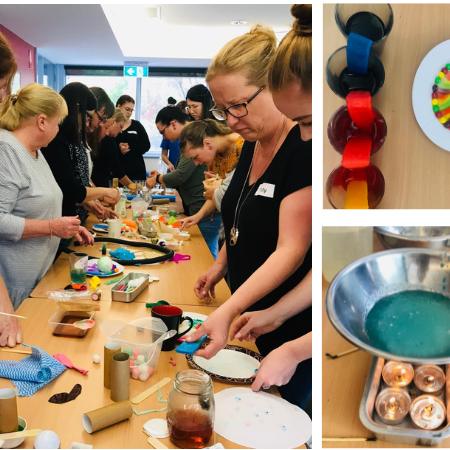Little Scientists: Water Workshop
Have you ever met a child who is not fascinated by water? From ice blocks to raindrops, children love to explore water from an early age.
Explore water with all your senses, investigate the different aggregate states and test the solubility of various substances. Discover how to create a nurturing learning environment through STEM inquiry with reflection on your current practice.
In this hands-on workshop, you will learn how to create rich STEM learning experiences and use water as a topic through which to teach the outcomes of the Early Years Learning Framework. Interactive activities can include:
- Exploring water with all five senses and investigating its many aggregate states.
- Exploring the density of water by making rainbow layers and “floating” objects.
- Finding out if it’s possible to boil water in balloons and mix (and then unmix!) colour pigments in water.
- Hiding objects within bubbles and making bubble cubes.
- Exploring capillary action with the walking water experiment and watching a stick of celery turn blue.
- Observing the interactions between ice and salt and hydrophobic and hydrophilic objects. Just to name a few!
Pedagogical topic: Co-construction, metacognition, and inquiry-based learning
Our Water Workshop is Little Scientists’ foundational workshop and we strongly recommend every educator attend this workshop at one point. This is because the topic of water provides an effective vehicle through which to explore the pillars of the Little Scientists’ educational approach: co-construction, metacognition, and inquiry-based learning. You will learn how to:
- Create a co-constructed learning environment by exploring water.
- Investigate the concepts of free exploration, prompted exploration and demonstration and discuss their role in inquiry-based practices.
- Explore your role in a co-constructed environment and practise documenting children’s learning.
- Critically reflect on the challenges and successes in your current STEM practices.
- Understand the important role of inquiry-based learning in early childhood education.
By the end of this workshop, you will be equipped with real-life ideas on how to create a nurturing setting for children to explore STEM in age-appropriate ways.
Links to Australian Professional Standards for Teachers
2.1 Content and teaching strategies of the teaching area
Apply knowledge of the content and teaching strategies of the teaching area to develop engaging teaching activities.
2.2 Content selection and organisation
Organise content into coherent, well-sequenced learning and teaching programs.
1.2 Understand how students learn
Structure teaching programs using research and collegial advice about how students learn.
3.2 Plan, structure and sequence learning programs
3.3 Use teaching strategies
3.4 Select and use resources
4.1 Support student participation
Establish and implement inclusive and positive interactions to engage and support all students in classroom activities.
Facilitator: Jess Shaw

